

How To Detox and Cleanse Your Body Naturally At Home. Cleansing the body periodically is an essential part of making it available for greater possibilities.

It’s always best to detox your body naturally, and this can start right at home. Yogi and mystic, Sadhguru, gives us simple methods to cleanse the five elements of the system and looks at how to detox and cleanse your body naturally. Sadhguru: Essentially, the body is a play of the five elements – water, earth, air, fire and space. It is very common in India to refer to the body as a puppet made of five elements. By composition, the body is seventy-two percent water, twelve percent earth, six percent air, four percent fire, and the remaining six percent space or akash. Sea Salt vs. Table Salt: Health Effects and Benefits. Sea salt vs. table salt production Sea salt is usually produced using solar evaporation of sea water or water from salt lakes.
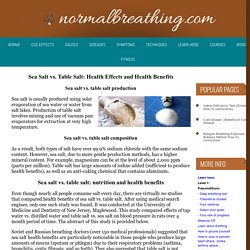
Production of table salt involves mining and use of vacuum pan evaporators for extraction at very high temperature. Sea salt vs. table salt composition. Fish Oil Benefits, Omega 3 and 6 EFAs. Content of this web page - manual Introduction4.1 Omega 3 benefits4.2 Side effects, risks and dangers of fish oil and other EFAs4.3 Fish oil vs. flaxseed oil and other vegetable oils4.4 What is the difference between DHA and EPA?

Major Nutrients Guide for Body O2: Ca, Mg, Zn and Fish Oil. Content of this web page:Part 1.
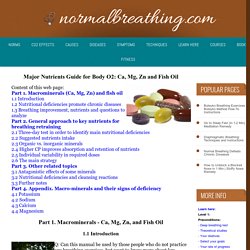
Macrominerals (Ca, Mg, Zn) and fish oil1.1 Introduction1.2 Nutritional deficiencies promote chronic diseases1.3 Breathing improvement, nutrients and questions to analyzePart 2. General approach to key nutrients for breathing retraining2.1 Three-day test in order to identify main nutritional deficiencies2.2 Suggested nutrients intake2.3 Organic vs. inorganic minerals2.4 Higher CP improves absorption and retention of nutrients2.5 Individual variability in required doses2.6 The main strategyPart 3. Other related topics3.1 Antagonistic effects of some minerals3.2 Nutritional deficiencies and cleansing reactions3.3 Further notesPart 4. Appendix. Macro-minerals and their signs of deficiency4.1 Potassium4.2 Sodium4.3 Calcium4.4 Magnesium. Fasting: Molecular Mechanisms and Clinical Applications. Intermittent fasting. Intermittent fasting (IF) describes diets that cycle between a period of fasting and non-fasting.
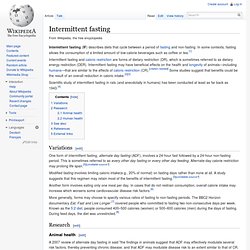
In some contexts, fasting allows the consumption of a limited amount of low-calorie beverages such as coffee or tea.[1] 5 Intermittent Fasting Methods: Which One Is Best for You? We’ve all heard of the latest fad diets: The no-fat, all-fat, cabbage-soup, six-small-meals, raw-veggies-no-dressing, gluten-free eating plans supposedly proven to help you lose weight fast.

What if we told you that the answer to losing weight, improving body composition, and feeling better overall might not even really be about dieting, but instead just skipping meals every once in a while? Pay it Forward. Elizabeth Bartlett is a professor of political science at a Midwestern university.

At the age of 42, her irregular heartbeat had become life-threatening. A heart transplant was her last hope, and she was fortunate to receive one. In a book chronicling her journey, she writes that she felt thankful for her new lease on life—but simply feeling thankful wasn’t enough. Why Gratitude Is Good. With Thanksgiving approaching, we’ll all soon be taking time to acknowledge what we’re grateful for.

It’s a nice gesture, of course, but why do we do it? What good is gratitude? For more than a decade, I’ve been studying the effects of gratitude on physical health, on psychological well-being, and on our relationships with others. digitalskillet In a series of studies, my colleagues and I have helped people systematically cultivate gratitude, usually by keeping a “gratitude journal” in which they regularly record the things for which they’re grateful.
Gratitude journals and other gratitude practices often seem so simple and basic; in our studies, we often have people keep gratitude journals for just three weeks. Physical • Stronger immune systems • Less bothered by aches and pains • Lower blood pressure • Exercise more and take better care of their health • Sleep longer and feel more refreshed upon waking. Languageeyes.pdf. The Inner Resilience Program. Mind Fitness Training Institute: Stress Resilience and Performance Enhancement (stress resiliency training) Do Mirror Neurons Give Us Empathy? This week Greater Good editor-in-chief Jason Marsh is reporting on highlights from the recent Being Human conference in San Francisco, including a round-up of some of the key themes and speakers, and an interview on the evolutionary roots of altruism with Yale psychologist Laurie Santos.
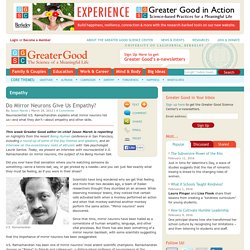
Today, we present an interview with neuroscientist V.S. Long-term musical group interaction has a positive influence on empathy in children. Musical group interaction (MGI) is a complex social setting requiring certain cognitive skills that may also elicit shared psychological states.
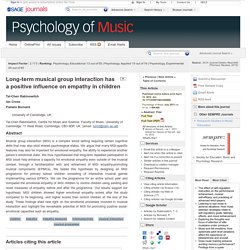
We argue that many MGI-specific features may also be important for emotional empathy, the ability to experience another person’s emotional state. We thus hypothesized that long-term repeated participation in MGI could help enhance a capacity for emotional empathy even outside of the musical context, through a familiarization with and refinement of MGI empathy-promoting musical components (EPMCs). We tested this hypothesis by designing an MGI programme for primary school children consisting of interactive musical games implementing various EPMCs.
Long-term musical group interaction has a positive influence on empathy in children. Musical group interaction (MGI) is a complex social setting requiring certain cognitive skills that may also elicit shared psychological states. We argue that many MGI-specific features may also be important for emotional empathy, the ability to experience another person’s emotional state. What is the Relationship Between Stress and Empathy? On Monday, we published a research brief, “How Anxiety Reduces Empathy,” that provoked some conversation and disagreement among readers. “I thought empathy increases stress and anxiety,” wrote one person—especially, she believed, if we empathize with people in a bad situation that we don’t have the power to improve. Does Playing Music Boost Kids’ Empathy? Music can make us feel nostalgic, melancholy, or energized. It can make us want to dance.
And, a new study suggests, it can make us feel more connected to other people, especially when we play music together. The study, recently published online in Psychology of Music, suggests that interacting with others through music makes us more emotionally attuned to other people, even beyond the musical setting. The Evolution of Empathy. Once upon a time, the United States had a president known for a peculiar facial display. In an act of controlled emotion, he would bite his lower lip and tell his audience, “I feel your pain.” Whether the display was sincere is not the issue here; how we are affected by another’s predicament is. Six Habits of Highly Empathic People. If you think you’re hearing the word “empathy” everywhere, you’re right.
It’s now on the lips of scientists and business leaders, education experts and political activists. But there is a vital question that few people ask: How can I expand my own empathic potential? Empathy is not just a way to extend the boundaries of your moral universe. According to new research, it’s a habit we can cultivate to improve the quality of our own lives. Compassion Definition. 3-Minute Breathing Space Online Course — Mindful Noggin. The Institute for the Advancement of Human Behavior (IAHB) has been approved as a provider of continuing education and continuing medical education by the organizations listed below. IAHB as the approved sponsor maintains responsibility for the enduring material educational activity offered and for following the standards and regulations for the organizations listed above (except where otherwise noted). ALCOHOLISM & DRUG ABUSE COUNSELORS: Approved by the National Association of Alcoholism and Drug Abuse Counselors Approved Provider Program (NAADAC Approved Education Provider #92713) for 6 CEHs.
Mindful Noggin. Institute for the Bio-Cultural Study of Religion. Treatments - Circadian Sleep Disorders Network. For Delayed Sleep Phase and Non-24. The Order of Time: Science - Galactic Time: What is it? Brain Lateralization. Emotion and memory. Emotion can have a powerful impact on memory. Numerous studies have shown that the most vivid autobiographical memories tend to be of emotional events, which are likely to be recalled more often and with more clarity and detail than neutral events. Manipulation checks. @ Ack! Memento.
AMMONIA TOXICITY: PART 2 - NutriStart. In part 2 of AMMONIA TOXICITY we are going to find out what we can do to remove ammonia from our body, both by supporting the organs involved in processing and disposing of it, and by taking supplements with an affinity for removing ammonia. We have seen that there are 3 organ systems in the body that produce and/or deal with ammonia: the liver, the kidneys and the intestines.
Let’s look at each one separately and see what we can do to facilitate their ammonia detoxification functions. Removal of ammonia begins with the liver, therefore keeping the liver healthy and well functioning will clearly help to improve ammonia removal. Since a major medical indicator of liver failure is high levels of ammonia in the bloodstream, it follows that detoxifying the liver may well be the best way to remove ammonia from the body. The liver normally receives some ammonia via the intestines, from the bacterial break-down of amino acids found in dietary protein.